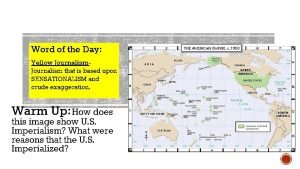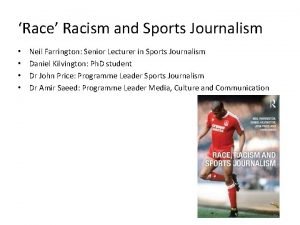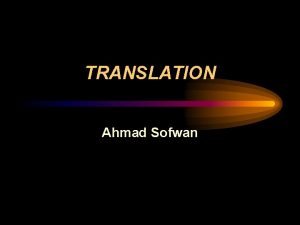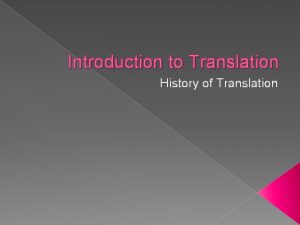in journalism Translation Journalism Translation and Journalism As













- Slides: 13

in journalism Translation

Journalism Translation and Journalism As you are likely aware, are many different types of journalism, which is the act of collecting and presenting news to a public audience. These types include print, such as you would find in magazines and newspapers, television, and internet. Each of these different types of journalism reaches out to different people in many places, who likely speak a variety of languages. This means that knowing a second language will help a journalist to reach out to their wide audience. However, not only is knowing a second language useful in creating content in said language, it is used for a variety of other things in journalism.

LANGUAGES AND JOURNALISM As a journalist, knowing a second language can help with more than creating content in that language. It can help you with jobs related to functioning in that language. Jobs that would require you to function in another language might include conducting interviews (in both foreign countries and with minorities in your own city) and investigations. It’s hard to go to Russia to investigate something and expect that everyone there will speak English. Knowing a second language will also help you to understand cultural context, which will better your presentation of the information you gather. It will also help you to listen and understand court trials so that you can get the best information possible. Another benefit is that you’ll know the nuances(distinction or variation) of specialized lingo in the language you learn. This can help with scientific, legal, medical, and political terminology.

LANGUAGES TO KNOW There are many languages used around the globe, but when it comes to journalism some of these languages are better to know than others. One such language is Arabic, which will help you with news related to the Middle East, CIA investigations, world affairs, and military operations. Another great language to know is Chinese – specifically Mandarin. Chinese is good for journalism related to business, technology, and manufacturing. A third language that would help your career is Spanish is a good language to have mastered when it comes to topics relating to Latin America, politics, and domestic issues, such as immigration to the United States. Last but not least, an important language to know is English. If it isn’t your first language, it would be wise to learn English for journalism as it would be helpful in issues ranging from politics to science.

JOURNALISM TODAY Journalism’s importance is growing stronger as the world comes closer together through advancing technologies. The world, however, does not yet speak one common language, and so with journalism becoming more important, so does the idea that journalists should know more than one language. If you are a journalist, knowing an additional language could boost your career and help you to get more involved in world affairs. Instead of rely on other people’s help to aid you in translation, you can get information faster and more directly by being fluent in multiple languages.

Translation in journalism is important for the globalization of information. Even if a story is produced in one language, the news can be understood by people that speak a different language.

If you are a journalist working in a multilingual society, you may have to work in more than one language. Whether you gather the information in one language and write the story in another, or whether you write a story first in one language and then rewrite in another language, you face the task of translation. However, if you have a good command of both languages and follow a few simple rules, translation should not be difficult. Language and style have looked at structure, words and grammar. I This is written only in English, but the processes we describe always involves two or more languages. It is possible that English will not be one of the languages you work in when translating. To avoid confusion, we will call the language which you are translating from (or conducting interviews in) the source language; and we will call the language you are translating into (or writing the final story in) the target language.

The principles of translation The first thing to remember is that translation is the transfer of meaning from one language to another. It is not the transfer of words from language to language. You must translate the meaning of what is being said, rather than do it word-for-word. This is because languages are not just different words. Different languages also have different grammar, different word orders, sometimes even words for which other languages do not have any equivalents. The English spoken by a scientist may have words which a simple farmer cannot even start to imagine. And the farmer is likely to have words for things the technologist never dreamed of.

Simple steps in translation We will start by talking about the simplest form of translation - the one where you already have a story written down in one language (the source) and you want to translate it into another language (the target). The steps to follow are:

1. Read the whole of the original source story through from beginning to end, to make sure that you can understand it. If you cannot understand everything that is said, you cannot translate it. If there any words or phrases that you do not understand, you must clarify these first. You may decide that the ideas they express are too difficult to translate or not worth translating, but you need to know what they are before you can judge. 2. Do a first draft translation, trying to translate all the source material. But do not translate word-for-word. Remember that you are translating the meaning. When you have finished the first translation, you will now have a draft story in the target language. 3. Go back over the whole of your draft translation and polish it without looking at the source original. (You might even like to turn the source story face down on your desk so you cannot cheat. ) Make sure that your translation reads well in the target language. 4. Compare the final version of your translation with the source original to make sure that you have translated it accurately. This is when you can make any detailed adjustments in individual words or phrases.

Dictionaries You cannot translate words in isolation. Words get their meaning from how they are used in each situation - what we call their context. You must do a contextual translation. You should use a bilingual dictionary where one is available, but be careful when looking up translations for individual words. Dictionaries are useful, but there is very often more than one translation for individual words. The best dictionary is one which defines the word in its various contexts. For example, a simple English word like "skip" has several quite different meanings. It can mean any of the following, depending on the context: to move lightly, especially by jumping from one foot to another; to omit or leave something out; to deal with something quickly and without much thought; a large container for transporting building materials, especially waste. It can even be short for "skipper", the captain of a ship or sports team. You can see that using the wrong translation of "skip" could have some unfortunate results. Listen to the little voice in your head if it tells you that a translation seems strange. It is better to ask advice than to write something silly. You may not know all the uses for each word, especially slang words which you cannot find in dictionaries. For example, mechanics often refer to an adjustable spanner as a "monkey wrench", when it has nothing to do with monkeys. Writing style You do not have to be an expert in linguistics to make good translations. If you know your target language well, you can usually hear in your head whether the sentence sounds correct in your translation. Your translation should not try to duplicate the word order or grammatical construction used in the source language unless it is also correct in your target language. For example, some languages put the verb (the "doing word") at the beginning of a sentence, some in the middle and some at the very end. You do not have to use all the words from your source material for translation if your target language can cope without them. For example, we may say in English "The ship sank lower in the water", whereas in another language the words "in the water" may be unnecessary because the words for "sink" in relation to "ship" already includes the idea of "water". Also, do not be afraid of using more words in your translation than in the original. Although in journalism you should aim to keep your sentences short and crisp, this must not be allowed to interfere with the clarity of the ideas you are trying to communicate.

Some other problem areas Translation is a very big and complicated field which we cannot discuss in great detail here. However, the following are some other problem areas you might want to keep in mind: Understatements and euphemisms Be aware of the cultural differences in languages. Some languages like to hide unpleasant facts beneath understatements or euphemism. Euphemisms are mild or inoffensive words which are used in the place of harsh or hurtful words. Some speakers might use humour in one situation which another language would not permit. Again, you must understand the meaning in context. Linking words Words such as "although", "but", "from", "even" and a host of others are usually very important in English, as they are used to show the relationships between the words in your sentences. Getting these small words wrong can alter entirely the sense of the sentence. Verbs These can sometimes cause problems in their different forms. There are, for example, quite distinct meanings for the words "can", "may", "must" and "should". If you are not sure, it is best to avoid the construction altogether and say it a different way. Accuracy Some languages are more accurate than others in certain areas. For example, many language groups in Papua New Guinea have more than 10 different words for varieties of sweet potato. The Inuit Indians of Canada have different words for 20 separate things which in English we just call "snow". English is not a precise language in many areas. Be aware that a vagueness in English may not be acceptable in another language. For example, we can say "Doctor Smith" in English, whereas in Chinese we have to know the gender of the doctor to translate the word "doctor". Ambiguity Sometimes the exact meaning in the source language is left unclear (ambiguous) on purpose, in which case you should try to keep it that way. This is especially so when reporting claims, accusations and hearsay evidence in such things as police stories. For example, a person might be charged in English with "unlawful carnal knowledge", which usually means a sexual offence against a person under the age of consent. You should not translate that as "rape of a child" or "sodomy of a little boy" or any other specific sexual act unless that is part of the charge. It is better in this case to use a phrase similar to "a sexual offence against a young person".

Names and titles There is still a debate about the need or otherwise of translating names from one language into another. For example, would you retain the English title "Education Department" or translate it into something like "office for schools"? Of course, a lot depends on how the rest of your community use the term, especially those people who are most closely involved, such as the Education Department itself. Your newspaper, radio or television station may have a policy on this. If not, perhaps you should get together to decide on a policy, taking into account how the community in general deals with names and titles. Get a large, hard-bound exercise book for the newsdesk, thumb-indexed A to Z down the side. You can call this your Translation Style Guide. Once you have agreed on the correct translation for any problem word, enter the word with its translation on to the correct page in the book. Revise the book every so often to make sure that all the entries are still relevant. If your newsroom computers are networked, create a common file which everyone can access. There are two ways people use names (or titles). The first is to identify the place or person, the second is to describe their function. It is usual to leave untranslated names which act as signposts for people, but translate those names which describe a function. For example, you would not translate the word "Baker" in the name "Baker Street", because it acts as a signpost, but you would probably translate the name "Police Station". If a language used by your community is also used elsewhere in the world, you should remain aware of how it is spoken in other countries. For example, French may be commonly used in your society, so you need to keep up-to-date with how French is used in other French-speaking countries. Remember that all languages change, especially in their motherland. Constantly refresh your understanding of the way the language is developing both in your own society and elsewhere.
 Conventional journalism
Conventional journalism Literary journalism vs traditional journalism
Literary journalism vs traditional journalism Journalism translation
Journalism translation Communicative meaning in semantics
Communicative meaning in semantics Transformation of a function
Transformation of a function Cisco voice translation rule
Cisco voice translation rule 10 noun phrases
10 noun phrases Journalism and literature similarities
Journalism and literature similarities Yellow journalism style
Yellow journalism style Yellow journalism examples
Yellow journalism examples Spanish brute political cartoon
Spanish brute political cartoon Race racism and sports journalism
Race racism and sports journalism Example of narrative lead
Example of narrative lead Facts about muckrakers
Facts about muckrakers
























